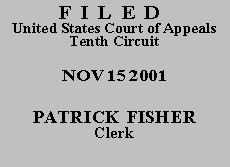

| STANTON S. HOLT,
Petitioner-Appellant, v. ROBERT D. HANNIGAN; ATTORNEY GENERAL OF THE STATE OF KANSAS, Respondents-Appellees. |
|
Petitioner Stanton S. Holt, a prisoner of the State of Kansas appearing pro se, appeals from denial of his petition for habeas relief filed under 28 U.S.C. § 2254. He has filed an application for a certificate of appealability to proceed on appeal. To obtain a certificate of appealability, petitioner must make "a substantial showing of the denial of a constitutional right." Id. § 2253(c)(2).
Petitioner was convicted in 1994 of numerous criminal offenses, including two murders, arising from a string of burglaries in Junction City, Kansas. The trial court sentenced him to two consecutive life sentences plus a term of 123 to 355 years. His conviction and sentence were upheld on direct appeal, and the Kansas Supreme Court decided each of petitioner's five issues on their merits. See State v. Holt, 917 P.2d 1332 (Kan. 1996). The trial court dismissed his state post-conviction petition. While his appeal from that dismissal was pending in the Kansas Court of Appeals, petitioner filed his pro se federal habeas petition, raising numerous issues. The district court determined that only two of petitioner's issues were not procedurally barred due to his failure to present them to the Kansas Supreme Court: (1) the trial court's instruction to the jury regarding felony murder failed to specify the underlying felony, and thereby relieved the State of its burden of proof and denied petitioner due process; and (2) petitioner's conviction and sentence for both felony murder and the underlying felony violated the Double Jeopardy Clause. The district court rejected these two claims on the merits, and denied habeas relief.
On appeal, petitioner raises these issues: (1) the trial judge appeared to be biased; (2) prosecutorial misconduct; (3) the evidence was insufficient to sustain the convictions for first degree murder; (4) error in the jury instructions; (5) a double jeopardy violation; and (6) ineffective assistance of trial counsel.
The district court correctly determined that only those issues that petitioner raised on direct appeal to the Kansas Supreme Court could be considered in this federal habeas proceeding because petitioner failed to present any issues in his post-conviction proceeding to that court. See O'Sullivan v. Boerckel, 526 U.S. 838, 842 (1999). Further, petitioner's procedural default was not excused because he did not demonstrate cause and prejudice for his failure to exhaust his issues, or that a fundamental miscarriage of justice would result if his issues were not addressed. See Edwards v. Carpenter, 529 U.S. 446, 451 (2000). The district court also evaluated petitioner's exhausted claims under the appropriate standard. That is, because the Kansas Supreme Court addressed petitioner's claims of error on the merits, a federal court is precluded from granting habeas relief unless the state proceeding "resulted in a decision that was contrary to, or involved an unreasonable application of, clearly established Federal law, as determined by the Supreme Court," 28 U.S.C. § 2254(d)(1), or "resulted in a decision that was based on an unreasonable determination of the facts in light of the evidence presented in the State court proceeding," § 2254(d)(2). In addition, a federal court "presume[s] the factual findings of the state court are correct unless petitioner can rebut this presumption by clear and convincing evidence." Smallwood v. Gibson, 191 F.3d 1257, 1265 (10th Cir. 1999) (citing § 2254(e)(1)).
Reading petitioner's brief liberally, the only issues presented on appeal that are not procedurally barred are the same two issues addressed on the merits by the district court. On these issues, we deny a certificate of appealability for substantially the same reasons as those given by the district court in its March 14, 2001 memorandum and order.
Petitioner's claims that the trial judge appeared to be biased, that there was prosecutorial misconduct, and that the evidence was insufficient to sustain the convictions for first degree murder are procedurally barred. See Smallwood, 191 F.3d at 1265.
Petitioner's claim of ineffective assistance of trial counsel is waived because he did not present this claim to the district court. See Singleton v. Wulff, 428 U.S. 106, 120 (1976).
The application for a certificate of appealability is denied and the appeal is DISMISSED. The mandate shall issue forthwith.
Entered for the Court
Senior Circuit Judge
*. This order and judgment is not binding precedent, except under the doctrines of law of the case, res judicata, and collateral estoppel. The court generally disfavors the citation of orders and judgments; nevertheless, an order and judgment may be cited under the terms and conditions of 10th Cir. R. 36.3.